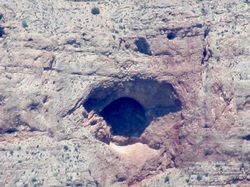Now when the Lord was about to take Elijah up to heaven by a whirlwind, Elijah and Elisha were on their way from Gilgal. 2Elijah said to Elisha, “Stay here; for the Lord has sent me as far as Bethel.” But Elisha said, “As the Lord lives, and as you yourself live, I will not leave you.” So they went down to Bethel. 3The company of prophets who were in Bethel came out to Elisha, and said to him, “Do you know that today the Lord will take your master away from you?” And he said, “Yes, I know; keep silent.” 4Elijah said to him, “Elisha, stay here; for the Lord has sent me to Jericho.” But he said, “As the Lord lives, and as you yourself live, I will not leave you.” So they came to Jericho. 5The company of prophets who were at Jericho drew near to Elisha, and said to him, “Do you know that today the Lord will take your master away from you?” And he answered, “Yes, I know; be silent.” 6Then Elijah said to him, “Stay here; for the Lord has sent me to the Jordan.” But he said, “As the Lord lives, and as you yourself live, I will not leave you.” So the two of them went on. 7Fifty men of the company of prophets also went, and stood at some distance from them, as they both were standing by the Jordan. 8Then Elijah took his mantle and rolled it up, and struck the water; the water was parted to the one side and to the other, until the two of them crossed on dry ground. 9When they had crossed, Elijah said to Elisha, “Tell me what I may do for you, before I am taken from you.” Elisha said, “Please let me inherit a double share of your spirit.” 10He responded, “You have asked a hard thing; yet, if you see me as I am being taken from you, it will be granted you; if not, it will not.” 11As they continued walking and talking, a chariot of fire and horses of fire separated the two of them, and Elijah ascended in a whirlwind into heaven. 12Elisha kept watching and crying out, “Father, father! The chariots of Israel and its horsemen!” But when he could no longer see him, he grasped his own clothes and tore them in two pieces.  This passage of Elijah and Elisha reminded me of the many mentors I've had in my life. People who have believed in me, people who have corrected me, people who have nurtured me, taught me... people who saw me. Really saw me. The gifts I had or didn't have but needed. But they didn't stop there. They chose to be in relationship with me, to develop a friendship, to sacrifice their time and their resources for my benefit. I wonder if Elisha were writing a thank you note to Elijah for all the things he learned, what would he say? What did he learn from Elijah? What did he learn by listening, by watching, by mistake? Since we don't have Elisha's thank you note, I'm writing my own today - for the mentors who have nurtured me to be who I am today. I am grateful for their mantels and for how in many ways I have tried to make them my own. I am grateful for June Renner Cervero, one of the youth leaders at my church. She used to take me to dinner. She paid for my first manicure. She liked me and it made me feel like a million bucks. I am grateful for Mary O'Brien Barton, the first official mentor of my adult life. She taught me about spiritual disciplines like silence and solitude. She introduced me to authors that changed my perspective on Christianity. And much of these deep conversations we had over zucchini fries. I am grateful for Mark McGrath, a former pastor who entrusted me with his congregation and in so doing allowed me to live into my gifts as a pastor. Mark has influenced my preaching more than any other - in content and in execution. And it's about time for me to meet him for breakfast again. I am grateful for Virginia Wiles, a seminary professor who encouraged, nurtured, and would take nothing less than my own unique voice in my writing. She taught me how to ignore rules and live into post modern methods. Mostly she somehow convinced me that I had something to say. I am grateful for Patricia Daley, a woman who met monthly with me and a colleague over tea at her dining room table the entire first year of my pastorate. She listened, affirmed, encouraged, critiqued, and strategized. And when the year was up, she connected me with a larger group of women with whom I continue to meet weekly. I am grateful for Elisha, who followed and stuck by Elijah til the very end - learning and grasping and watching and waiting. And who with trembling hands held the mantel of his mentor and tested it out on the waters saying, "Where is the God of Elijah?" Might the God of our Elijah's show up for us as well.
1 Comment
26Then they arrived at the country of the Gerasenes, which is opposite Galilee. 27As he stepped out on land, a man of the city who had demons met him. For a long time he had worn no clothes, and he did not live in a house but in the tombs. 28When he saw Jesus, he fell down before him and shouted at the top of his voice, “What have you to do with me, Jesus, Son of the Most High God? I beg you, do not torment me”— 29for Jesus had commanded the unclean spirit to come out of the man. (For many times it had seized him; he was kept under guard and bound with chains and shackles, but he would break the bonds and be driven by the demon into the wilds.) 30Jesus then asked him, “What is your name?” He said, “Legion”; for many demons had entered him. 31They begged him not to order them to go back into the abyss. 32Now there on the hillside a large herd of swine was feeding; and the demons begged Jesus to let them enter these. So he gave them permission. 33Then the demons came out of the man and entered the swine, and the herd rushed down the steep bank into the lake and was drowned. 34When the swineherds saw what had happened, they ran off and told it in the city and in the country. 35Then people came out to see what had happened, and when they came to Jesus, they found the man from whom the demons had gone sitting at the feet of Jesus, clothed and in his right mind. And they were afraid. 36Those who had seen it told them how the one who had been possessed by demons had been healed. 37Then all the people of the surrounding country of the Gerasenes asked Jesus to leave them; for they were seized with great fear. So he got into the boat and returned. 38The man from whom the demons had gone begged that he might be with him; but Jesus sent him away, saying, 39“Return to your home, and declare how much God has done for you.” So he went away, proclaiming throughout the city how much Jesus had done for him. In Brain on Fire: My Month of Madness I don't remember anything from this experience... all told to me after the fact. My boyfriend heard guttural sounds coming from me... the grunts were very unnatural sounding, so he turned and looked at me. And he saw that my eyes were wide open but completely unseeing... At that point, my arms whipped out, and I had a grand mal seizure, and I was convulsing. I bit my tongue so that blood and a kind of a combination of blood and foam was coming out of my mouth. ... I slurred my words, I drooled... I believed that I could age people with my mind...  He did not live in a house but in the tombs. He did not live in a house but in the tombs. Her story is one of many found easily on the internet connecting an ancient understanding of demon possession with severe mental illness. In her case, she was finally diagnosed with anti-NMDA receptor encephalitis, a rare autoimmune disease that can attack the brain. Cahalan says, "doctors think the illness may account for cases of 'demonic possession' throughout history." As I was reading this week's gospel text, I began to wonder about all the people who had cared for this "demoniac" over his lifetime. Who is his mother? Did she have to send him to live in the tombs or did he run away? Who feeds him? Do people from the village bring him food from time to time? Do they leave it for him at a safe distance or are there people he trusts to come near? Does he have friends? Did he have spouts of being in his "right mind" before? Like so many suffering with mental illness, did he have periods where he was seemingly balanced, functioning, with clear thoughts? And if so, did his friends or family interact with him during those times? And if so, did they sit on edge waiting for the behavior to take its inevitable turn. Fear, depression, suicide. Medication in our world. Chemical imbalances. Sleep deprivation. Anger. Rage. Sadness. Crying. Confusion. Hallucinations. Have you ever befriended a person that suffers with mental illness? There is always volatility, always unknown outcomes, always concern, never stability. Perhaps this is the week to begin an honest conversation about mental illness and the love of God. Perhaps this is the week to take seriously Jesus' want for wholeness for this man. Perhaps this is the week to see that Jesus honored the request of the demons over and above the financial livelihood of the Gentile village. This scene is an extreme account of Jesus interacting with "other." He's in a Gentile town with a major pork industry. The giver of life is befriending a man who lives among the tombs. And when he leaves their town, he leaves them to befriend one another. I would love to know how this man's story ends. Later the following events took place: Naboth the Jezreelite had a vineyard in Jezreel, beside the palace of King Ahab of Samaria. 2And Ahab said to Naboth, “Give me your vineyard, so that I may have it for a vegetable garden, because it is near my house; I will give you a better vineyard for it; or, if it seems good to you, I will give you its value in money.” 3But Naboth said to Ahab, “The Lord forbid that I should give you my ancestral inheritance.” 4Ahab went home resentful and sullen because of what Naboth the Jezreelite had said to him; for he had said, “I will not give you my ancestral inheritance.” He lay down on his bed, turned away his face, and would not eat. 5His wife Jezebel came to him and said, “Why are you so depressed that you will not eat?” 6He said to her, “Because I spoke to Naboth the Jezreelite and said to him, ‘Give me your vineyard for money; or else, if you prefer, I will give you another vineyard for it’; but he answered, ‘I will not give you my vineyard.’” 7His wife Jezebel said to him, “Do you now govern Israel? Get up, eat some food, and be cheerful; I will give you the vineyard of Naboth the Jezreelite.” 8So she wrote letters in Ahab’s name and sealed them with his seal; she sent the letters to the elders and the nobles who lived with Naboth in his city. 9She wrote in the letters, “Proclaim a fast, and seat Naboth at the head of the assembly; 10seat two scoundrels opposite him, and have them bring a charge against him, saying, ‘You have cursed God and the king.’ Then take him out, and stone him to death.” 11The men of his city, the elders and the nobles who lived in his city, did as Jezebel had sent word to them. Just as it was written in the letters that she had sent to them, 12they proclaimed a fast and seated Naboth at the head of the assembly. 13The two scoundrels came in and sat opposite him; and the scoundrels brought a charge against Naboth, in the presence of the people, saying, “Naboth cursed God and the king.” So they took him outside the city, and stoned him to death. 14Then they sent to Jezebel, saying, “Naboth has been stoned; he is dead.” 15As soon as Jezebel heard that Naboth had been stoned and was dead, Jezebel said to Ahab, “Go, take possession of the vineyard of Naboth the Jezreelite, which he refused to give you for money; for Naboth is not alive, but dead.” 16As soon as Ahab heard that Naboth was dead, Ahab set out to go down to the vineyard of Naboth the Jezreelite, to take possession of it.  "He went, laid on his bed, turned his face and would not eat." The King of Israel, the one in charge, the man with the power to do as he pleases - sulking, defeated. He wanted the vineyard beside his house to use as his own personal vegetable garden. He wanted something and was told no. And so he sulks in his room. His wife reminds him of his power and she takes charge of the outcome - creating the kind of drama that would make Desperate Housewives proud. She sent letters, creating a coalition. She hired liars. And assembled the people. Let the drama begin. The people gather - Lies are told about Naboth - Naboth is stoned to death - Jezebel goes home to her defeated husband - the King gets his heart's desire. Desire + Greed + Lies + Cruelty = Stolen Property = A Happy King  Or does it? The King knows that Naboth was right in not handing over his family vineyard. Naboth was completely within his rights to hold onto his property, his inheritance. Not even the King's hand extends into another person's inheritance. How do we understand this kind of greed for property that belongs to another? Or how do we translate rightful ownership of inheritance in our culture? In a capitalistic society where we are entitled to all that we can purchase, is there a limit to the reach of our money? In other words, just because we can afford it (or because we have the credit to buy it), is it ours to rightfully acquire? I suppose the first thing that comes to mind is buying cheap clothes - because I can - that ultimately keep people in poverty in other parts of the world. Is that wanting to make someone's vineyard into my vegetable garden? Or buying bananas - something almost every American household purchases. Almost none of us live anywhere close to where bananas are produced. It costs an enormous amount of resources from the earth to deliver those bananas to us. Is that wanting to make someone's vineyard into my vegetable garden? I don't know the answer. But I'm not done asking questions. I remember a story from Nicholas Kristof and Sheryl WuDunn's - Half the Sky: Turning Oppression into Opportunity for Women Worldwide What does it mean to want the vineyard next door for our own vegetable garden? And what is the price of taking it? In Ahab's case, he took another man's inheritance, amassing his own wealth and presumably a greater inheritance for his sons. When we read on, we find that God has planned to remove every possible heir
8Then the word of the Lord came to him, saying, 9“Go now to Zarephath, which belongs to Sidon, and live there; for I have commanded a widow there to feed you.” 10So he set out and went to Zarephath. When he came to the gate of the town, a widow was there gathering sticks; he called to her and said, “Bring me a little water in a vessel, so that I may drink.” 11As she was going to bring it, he called to her and said, “Bring me a morsel of bread in your hand.” 12But she said, “As the Lord your God lives, I have nothing baked, only a handful of meal in a jar, and a little oil in a jug; I am now gathering a couple of sticks, so that I may go home and prepare it for myself and my son, that we may eat it, and die.” 13Elijah said to her, “Do not be afraid; go and do as you have said; but first make me a little cake of it and bring it to me, and afterwards make something for yourself and your son. 14For thus says the Lord the God of Israel: The jar of meal will not be emptied and the jug of oil will not fail until the day that the Lord sends rain on the earth.” 15She went and did as Elijah said, so that she as well as he and her household ate for many days. 16The jar of meal was not emptied, neither did the jug of oil fail, according to the word of the Lord that he spoke by Elijah.  She has so very little to begin with, it seems almost insane that Elijah would ask for a piece of bread first. "First, feed me and then you'll see that the oil and flour will not run out." First feed me. Really? One of the first rules of taking care of others is making sure to take care of yourself. We're reminded each flight, "take care to put your own oxygen mask on first before assisting other passengers." And this widow is the one assigned to help Elijah. God says to Elijah, "I have commanded a widow to feed you." The relationship that Elijah is forging with this woman is complicated from the start. She was commanded to feed Elijah and yet her first words in response to his request sought to explain why she could do no such thing. So, either she didn't get the memo from God or she didn't understand the economics of the request. Elijah is to be fed by her; Elijah must explain how it will work.  First give me something to eat. Yes, first give me what you perceive to be the last that you have. And then go back and you will find it is not the last that you have. In fact, you will find that as long as we engage in this exchange, as long as it takes for God to send rain, the oil and the flour will not run out. Now, go ahead and make me something to eat. What is needed of her to engage in this exchange? How does she summon the courage? Is it courage? Is it trust? After it works the first time, after the first success, does she ever doubt that the miracle will continue? Does she have to summon the courage or faith or whatever this is - each day? How does she engage in emptying what she has every day? Every day. One day at a time. Just for one more day. I can trust today. I don't know about tomorrow. But I can trust today. I can empty what I have today. |
Search this blog for a specific text or story:
I am grateful for
|

This work is licensed under a Creative Commons Attribution-NonCommercial-ShareAlike 3.0 Unported License.
